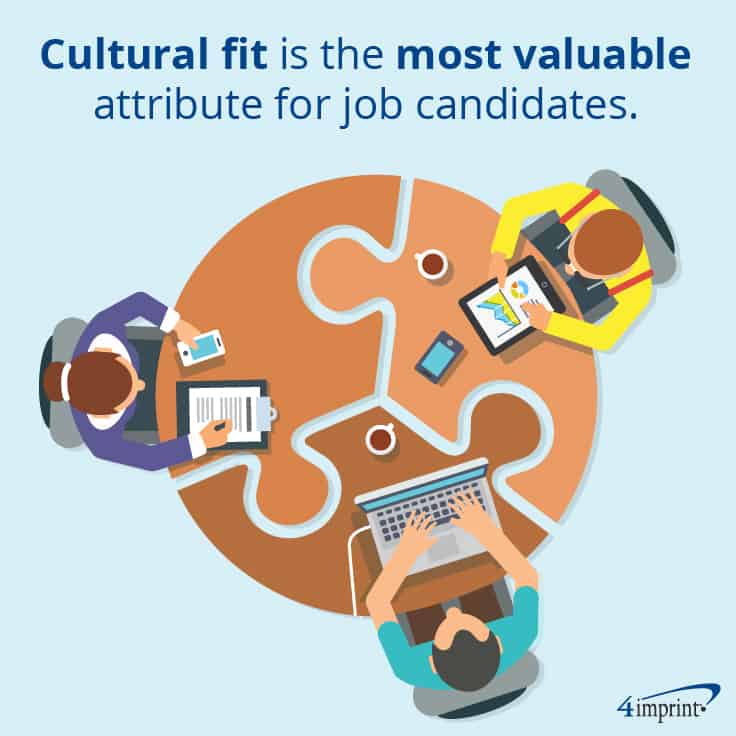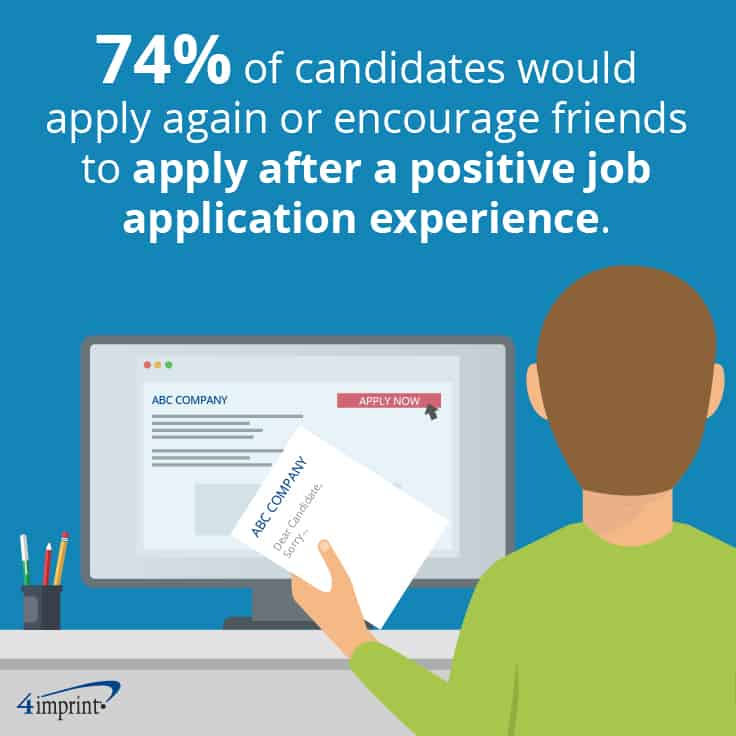The interview: that part of the job-seeking process that frays most candidates’ nerves. And while candidates may literally break a sweat trying to put their best foot forward, making a good impression during the interview is just as crucial for the company. Yes, it’s your chance as an interviewer to assess a candidate’s culture and job fit correctly, but it’s also a time for potential hires to get a feel for your company.
In this Blue Paper, we’ll talk about how a mix of modern and classic interview methods, along with employee recruitment giveaways, are helping employers find a perfect fit for every job opening. And we’ll suggest some fresh ways to help you select your perfect candidate and convince them to join your team.
The importance of knowing how to interview

According to the employment company Monster, teaching interview-and-hiring best practices to managers is critical to finding candidates who meet the needs of your company. And a recent 4imprint® survey revealed that 58% of companies provide training on interview techniques.
Why is this training so critical? Because hiring the wrong person can cost $11,000 for a business with fewer than 500 employees—and twice that for a company with more than 500 employees. And that’s before factoring in the cost of hiring a new employee, which can run anywhere from $4,000 to $7,000.
With so much of your company’s resources on the line, it’s critical that managers ask the right interview questions for the job. Rather than submit potential staff members to off-the-cuff interviews, the staffing experts at Robert Half® recommend that managers:
- Review the job description to understand what to look for during the interview.
- Review the candidate’s work history. Note anything critical to ask, from experience to employment gaps to unusual job titles.
- Prepare key interview questions based on their experience and your business needs.
- Schedule it out. Respect the candidate’s time by planning out each portion of the interview, from introductions to specific questions to tours, so nothing is forgotten or rushed.
- Meet in a comfortable, private setting to avoid interruptions.
Evaluate the proper attributes
As you prepare to meet with job candidates, it may seem that the person with the most experience or qualifications will be the best fit for the position, but that isn’t necessarily the case. 4imprint’s survey showed that while 84% of companies evaluated a candidate’s work experience, only 12% found it valuable.
Meanwhile, cultural fit—which was evaluated 75% of the time—was considered the most valuable attribute by the largest number of respondents (44%).

ConveyIQ suggests evaluating employees for cultural fit using questions in three areas: character, teamwork and communication:
- Character: Describe your ideal working environment. What do you value in a job?
- Teamwork: When you work on a team, what role do you usually take? Describe your ideal manager.
- Communication: How do you sell your ideas to others? Discuss a time when you didn’t communicate effectively; then talk about what you would have done differently.
Modern methods of assessment
Knowing what to look for in an interview can help you determine the most appropriate way to conduct the interview.
For example, Expedition Technology in Dulles, Virginia, uses a mix of classic and modern interview assessments as well as the occasional recruiting giveaway item.
“Any candidates we’re considering will perform a phone screen with me and if they qualify, I’ll set them up with a time to have a further conversation with our director of engineering,” said Holly Palmer, director of human resources. “He does a more technical phone interview. If both our phone interviews go well, we’ll bring a candidate onsite for a face-to-face interview.”
While technical skills are important, softer skills get a strong focus. “[We] definitely [look for] a cultural fit for sure. We are a very collaborative organization, and people need to be able to work in teams,” she said. “The most important intangible thing we look for is intellectual curiosity. We want people who won’t stop at the first answer, that’ll keep digging, or look for solutions from another angle.”
While they don’t always offer swag after an in-person interview, Palmer noted that they sometimes offer an item like a water bottle to candidates after a great interview. On their first day, employees receive a collection of swag. “Since it’s company-branded merchandise, the swag helps assimilate them into our culture and makes them feel they are already part of our team. We even present their gifts in a gift bag with company-colored tissue to make it really festive.” Palmer said.
Video interviews
While 64% of organizations currently perform a phone interview as part of their recruitment process, speaking on the phone doesn’t always tell the whole story. Research tells us that 90% of what we feel is stated not through words, but through facial expressions and body language.
Therefore—thanks to cameras built into smartphones, computers and tablets—conducting a video interview is becoming more common.
Soft-skills assessments
Often, a candidate’s personality can be just as critical as their accomplishments. This is why many organizations are digging deeper into potential candidates’ grit, curiosity and teamwork skills. As part of the interview process, 1 in 5 organizations perform personality tests, and 1 in 9 use cultural assessments.
Virtual reality assessments
In the survey linked above, one in 25 companies request a homework assignment from candidates, taking the opportunity to test employee skills for themselves. And increasingly, they’re using virtual reality to evaluate job-critical skills.
To accomplish this, candidates are put into a virtual simulation of the workplace they are looking to join. Managers can put the recruits in situations that demonstrate their skills and problem-solving abilities firsthand, while being monitored and evaluated.
Job auditions
Naturally, the best way to get a sense of how someone would fill their new position is to have them fill in before officially being hired. Some companies have candidates job shadow or perform the job they’re hoping to get. These auditions can range anywhere from half a day to three weeks, with employees in the latter position being paid as temporary workers while determining if the job is a good fit.
Remember that you’re also being interviewed
Now more than ever, leaving candidates with a positive view of your company is important. Even if the candidate isn’t the right fit for the job today, making an excellent impression can prove to be valuable to your organization in the future.
After a positive job application experience, 74% of job candidates say they would patronize the company, apply again later, and encourage their friends to apply.

One of the ways Tatianna Harris builds a positive impression of her company is by handing out recruiting giveaway items to candidates at every stage of the recruitment process. She’s the director of digital marketing of Cybrary, Inc., a company that provides free online training and workforce development designed to help people in the cybersecurity industry.
The company offers promotional items to recruits from the minute they meet at a conference or networking event to their first day on the job, including when they interview for a position. “Even if we don’t think they’re the best fit for the job at the time, we’ll still give them a pen or a notepad,” Harris said. “Even if they don’t get the job, they can still use a notebook and pen while taking other interviews or looking for a different position. Or maybe they’ll find someone later who needs cybersecurity training and be able to spread that awareness.”
What are other ways you can show candidates a higher level of care?
- Send thank-you notes to people who interview for a position.
- Keep promises—like getting in touch when you stated you would.
- Let candidates who didn’t get the job know that they’re no longer being considered for the position.
Performing this level of care will help you keep candidates happy—and your potential staff pool full.
The right interview finds the right candidate
As companies and technology grow and change, interview methods and are sure to evolve. Whether you interview over the phone, test skills in virtual reality, or offer recruiting giveaway items to keep your company top of-mind when the interview is over, these techniques can help you find the staff members you’ve been seeking.

